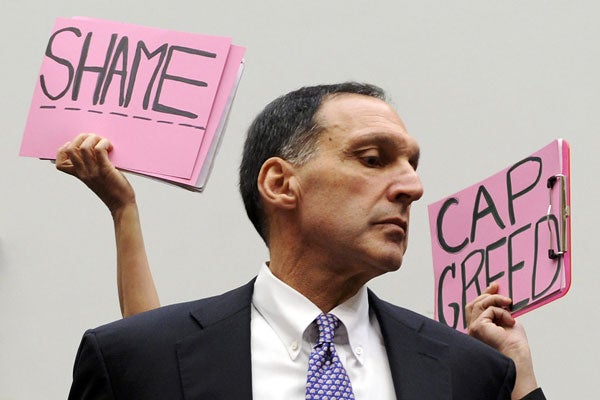Too Big To Fail, By Andrew Ross Sorkin

Your support helps us to tell the story
From reproductive rights to climate change to Big Tech, The Independent is on the ground when the story is developing. Whether it's investigating the financials of Elon Musk's pro-Trump PAC or producing our latest documentary, 'The A Word', which shines a light on the American women fighting for reproductive rights, we know how important it is to parse out the facts from the messaging.
At such a critical moment in US history, we need reporters on the ground. Your donation allows us to keep sending journalists to speak to both sides of the story.
The Independent is trusted by Americans across the entire political spectrum. And unlike many other quality news outlets, we choose not to lock Americans out of our reporting and analysis with paywalls. We believe quality journalism should be available to everyone, paid for by those who can afford it.
Your support makes all the difference.Time passes and it heals, or at least it bandages up. Wall Street's banks are raking billions once more, the global economy is sputtering back to life and the chances of wresting control of our destinies from unfettered finance recede with each incremental improvement. Andrew Ross Sorkin wants Too Big To Fail to be a reminder of just how close to the abyss the whole system came last year when Lehman Brothers crashed and AIG crumbled, and a call to arms in favour of reform. Actually, he has written a book that douses the very fury which might lead to radical change. It is a reasonable book, methodically researched and persuasive. There are no villains here, and a good few heroes. So be it.
The drama is alive with splendid anecdotes, piquant dialogue and page-turning cliffhangers. One minute we are on the bus with the entire board of Goldman Sachs being escorted through Moscow to a clandestine drinks do with Hank Paulson, their former boss and now US Treasury secretary. Then we are with Bob Diamond, the American who runs Barclays investment bank, as he taps out the furious phrase "Little England", on learning that the British government, like the US government, will not risk taxpayer money to help him buy Lehman. Later, we are crossing the road with an AIG vice-president taking a briefcase containing $14bn – yes, billion – in bond certificates to the Federal Reserve in New York as collateral for the bailout loan that came with just minutes to spare.
Most of all, we are with the energetic but ultimately exhausted Paulson, as he leaps from crisis to crisis, first trying to cajole Dick Fuld of Lehman to sell the doomed firm, then plotting to insert himself into the "holy war" over the mortgage giants Fannie Mae and Freddie Mac, and finally, reeling from scheme to scheme to hold everything together after fatally underestimating the fall-out from letting Lehman die.
Too Big To Fail rips along at such a pace that even the reader is hard-pressed to stop and ask the what ifs. While no one can be happy that the tale ends with taxpayers paying hundreds of billions of dollars to prop up failed banks and fallible bankers, there are few signposts to better outcomes. That the US Treasury secretary came from Goldman, and didn't have to learn the intricacies of derivatives trading on the job, seems a blessing, rather than the curse many now suggest. It was bad enough that the head of the Securities and Exchange Commission, a former Congressman called Christopher Cox, appears "cryogenically frozen" in fear; how much worse if all the president's men had been the same?
Journalists are normally content to write the first draft of history, but Ross Sorkin, mergers and acquisitions reporter for the New York Times, is performing well above his pay grade. He has augmented 500 hours of interviews with 200 participants with access to their email and phone records, private notes and even expenses forms. Too Big To Fail stakes a good claim to being the definitive story of our once-in-a-lifetime crisis.
But because the fruits of his detective work are so rich, it is startling when Ross Sorkin leaves us with the whiff of secrets undiscovered. Amid the desperate wheeler-dealing of Lehman's final week, we discover that Goldman was poring over the stricken firm's books. Had they been secretly hired to advise the Treasury? Had Paulson suggested they buy the firm? Either would have been in contravention of the Treasury secretary's promise to keep his old employer at arm's length. On this sensitive topic, you can almost hear Ross Sorkin's interviewees clamming shut. History, like the journalism before it, is only as good as the memories and motives of its sources.
The circumstances by which financial jiggery-pokery took over the world – and, yes, the culpability of some – will have to be sought elsewhere. By the collapse of Bear Stearns in March 2008, the system is already far too big to fail. Everyone is battling heroically against forces unleashed years before. Ken Lewis, Bank of America boss, said as much this year in testimony to Congress. "I believe that committed people of good intentions, in both the private sector and the government, worked desperately hard in late 2008 to prevent a collapse of the global financial system... I believe those efforts will be well remembered long after any current controversy is forgotten." Too Big To Fail is how we remember them.
Stephen Foley, associate business editor of 'The Independent', was named Business Journalist of the Year in the 2009 British Press Awards
Join our commenting forum
Join thought-provoking conversations, follow other Independent readers and see their replies
Comments